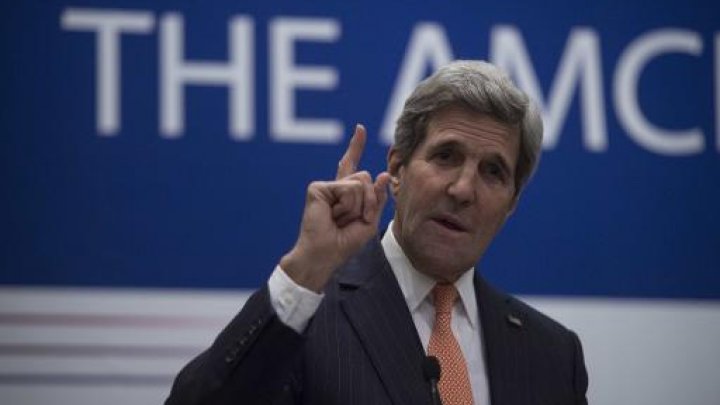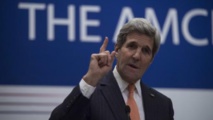AFP correspondents in Syria's devastated second city Aleppo, divided between the rebel-held east and regime-controlled west since mid-2012, said fighting appeared to have stopped as the ceasefire took effect.
A final rocket was fired from the east into government areas just five minutes before 7:00 pm.
The Syrian Observatory for Human Rights monitoring group said later it was "quiet" on nearly all fronts.
US Secretary of State John Kerry told reporters in Washington it was "far too early to draw conclusions", but noted that reports he received two hours after the truce came into effect suggested "some reduction" in violence.
"For all the doubts that remain, and there will be challenges in the days to come, this plan has a chance to work," he said of the deal he agreed on Friday with his Russian counterpart Sergei Lavrov.
"And I urge all the parties to support it because it may be the last chance that one has to save a united Syria," Kerry said.
On the ground in Syria, residents hoped for the best.
"I was checking the time all day, waiting for it to turn 7:00," said Khaled al-Muraweh, a 38-year-old shopkeeper in western Aleppo's Furqan district.
"I hope the ceasefire holds so I can see my brother who lives in the opposition-held part of the city."
In the east, residents celebrated the start of the Muslim holiday of Eid al-Adha.
"This was the calmest day since I got married a week ago," said Shadi Saber, 26.
- 'We aren't very hopeful' -
Syria's armed forces announced a seven-day "freeze" on military operations, but opposition forces have yet to formally sign up to the truce.
The deal's fragility was underscored even before it took effect when President Bashar al-Assad vowed to retake all of Syria from "terrorists".
It is the latest in a series of efforts to try to halt Syria's five-year war that has killed more than 290,000 people and displaced half the population.
Under the deal, fighting will halt across areas not held by jihadists and aid deliveries to besieged areas will begin, with government and rebel forces ensuring unimpeded humanitarian access to Aleppo in particular.
Rebels broke a regime siege of the east in August, but Assad loyalists restored the blockade on September 8.
The ceasefire will be renewed every 48 hours and, if it holds for a week, Moscow and Washington will begin an unprecedented joint campaign to target jihadist forces.
Senior Russian military official Sergei Rudskoi said the "cessation of hostilities is being resumed across all the territory of Syria" but that Moscow would "continue to carry out strikes against terrorist targets".
Russia's deputy foreign minister, Mikhail Bogdanov, said UN special envoy Staffan de Mistura could invite parties to new peace talks "at the very beginning of October".
Kerry also said that the only "realistic and possible solution" to the conflict would be a return to UN-mediated peace talks.
Just before the truce began, the Observatory reported 13 people killed by regime shelling of the rebel town of Douma near Damascus and another 13 killed in unidentified raids in Idlib province.
Bombardment rocked the central town of Talbisseh all day, an activist there said, finally quieting down as the truce came into effect.
"We spent Eid in our bomb shelters and basements today," said Hassan Abu Nuh of the Muslim holiday.
- Rebels demand 'guarantees' -
But Syria's opposition and rebels remain deeply sceptical and have yet to endorse the deal.
Salem al-Muslet, spokesman for the High Negotiations Committee opposition umbrella group, demanded "guarantees" on which rebel groups would be targeted.
Rebels on Sunday sent a letter to Washington saying they would "deal positively with the idea of the ceasefire" but listed several "concerns" and stopped short of a full endorsement.
"The clauses of the agreement that have been shared with us do not include any clear guarantees or monitoring mechanisms... or repercussions if there are truce violations," they said.
Ahmad al-Saoud, who heads the US-backed Division 13 rebel group which signed the letter, said they had received no response.
And the Istanbul-based opposition National Coalition also called for "clear monitoring mechanisms" for the truce.
A crucial part of the deal calls for rebels to distance themselves from the jihadist Fateh al-Sham Front -- previously known as Al-Nusra Front -- before joint US-Russian operations begin.
But Fateh al-Sham cooperates closely with many of Syria's rebels, including the powerful Ahrar al-Sham faction which has condemned the Russian-US deal.
The Syrian government and its allies Iran and Lebanon's Hezbollah movement have backed the truce.
But on Monday, Assad made clear that "the Syrian state is determined to recover every area from the terrorists".
"The armed forces are continuing their work, relentlessly and without hesitation, regardless of internal or external circumstances," he said as he toured a former rebel stronghold near Damascus.
----------------------------------------------------------------------------------------------------------
A final rocket was fired from the east into government areas just five minutes before 7:00 pm.
The Syrian Observatory for Human Rights monitoring group said later it was "quiet" on nearly all fronts.
US Secretary of State John Kerry told reporters in Washington it was "far too early to draw conclusions", but noted that reports he received two hours after the truce came into effect suggested "some reduction" in violence.
"For all the doubts that remain, and there will be challenges in the days to come, this plan has a chance to work," he said of the deal he agreed on Friday with his Russian counterpart Sergei Lavrov.
"And I urge all the parties to support it because it may be the last chance that one has to save a united Syria," Kerry said.
On the ground in Syria, residents hoped for the best.
"I was checking the time all day, waiting for it to turn 7:00," said Khaled al-Muraweh, a 38-year-old shopkeeper in western Aleppo's Furqan district.
"I hope the ceasefire holds so I can see my brother who lives in the opposition-held part of the city."
In the east, residents celebrated the start of the Muslim holiday of Eid al-Adha.
"This was the calmest day since I got married a week ago," said Shadi Saber, 26.
- 'We aren't very hopeful' -
Syria's armed forces announced a seven-day "freeze" on military operations, but opposition forces have yet to formally sign up to the truce.
The deal's fragility was underscored even before it took effect when President Bashar al-Assad vowed to retake all of Syria from "terrorists".
It is the latest in a series of efforts to try to halt Syria's five-year war that has killed more than 290,000 people and displaced half the population.
Under the deal, fighting will halt across areas not held by jihadists and aid deliveries to besieged areas will begin, with government and rebel forces ensuring unimpeded humanitarian access to Aleppo in particular.
Rebels broke a regime siege of the east in August, but Assad loyalists restored the blockade on September 8.
The ceasefire will be renewed every 48 hours and, if it holds for a week, Moscow and Washington will begin an unprecedented joint campaign to target jihadist forces.
Senior Russian military official Sergei Rudskoi said the "cessation of hostilities is being resumed across all the territory of Syria" but that Moscow would "continue to carry out strikes against terrorist targets".
Russia's deputy foreign minister, Mikhail Bogdanov, said UN special envoy Staffan de Mistura could invite parties to new peace talks "at the very beginning of October".
Kerry also said that the only "realistic and possible solution" to the conflict would be a return to UN-mediated peace talks.
Just before the truce began, the Observatory reported 13 people killed by regime shelling of the rebel town of Douma near Damascus and another 13 killed in unidentified raids in Idlib province.
Bombardment rocked the central town of Talbisseh all day, an activist there said, finally quieting down as the truce came into effect.
"We spent Eid in our bomb shelters and basements today," said Hassan Abu Nuh of the Muslim holiday.
- Rebels demand 'guarantees' -
But Syria's opposition and rebels remain deeply sceptical and have yet to endorse the deal.
Salem al-Muslet, spokesman for the High Negotiations Committee opposition umbrella group, demanded "guarantees" on which rebel groups would be targeted.
Rebels on Sunday sent a letter to Washington saying they would "deal positively with the idea of the ceasefire" but listed several "concerns" and stopped short of a full endorsement.
"The clauses of the agreement that have been shared with us do not include any clear guarantees or monitoring mechanisms... or repercussions if there are truce violations," they said.
Ahmad al-Saoud, who heads the US-backed Division 13 rebel group which signed the letter, said they had received no response.
And the Istanbul-based opposition National Coalition also called for "clear monitoring mechanisms" for the truce.
A crucial part of the deal calls for rebels to distance themselves from the jihadist Fateh al-Sham Front -- previously known as Al-Nusra Front -- before joint US-Russian operations begin.
But Fateh al-Sham cooperates closely with many of Syria's rebels, including the powerful Ahrar al-Sham faction which has condemned the Russian-US deal.
The Syrian government and its allies Iran and Lebanon's Hezbollah movement have backed the truce.
But on Monday, Assad made clear that "the Syrian state is determined to recover every area from the terrorists".
"The armed forces are continuing their work, relentlessly and without hesitation, regardless of internal or external circumstances," he said as he toured a former rebel stronghold near Damascus.
----------------------------------------------------------------------------------------------------------









 Home
Home Politics
Politics











